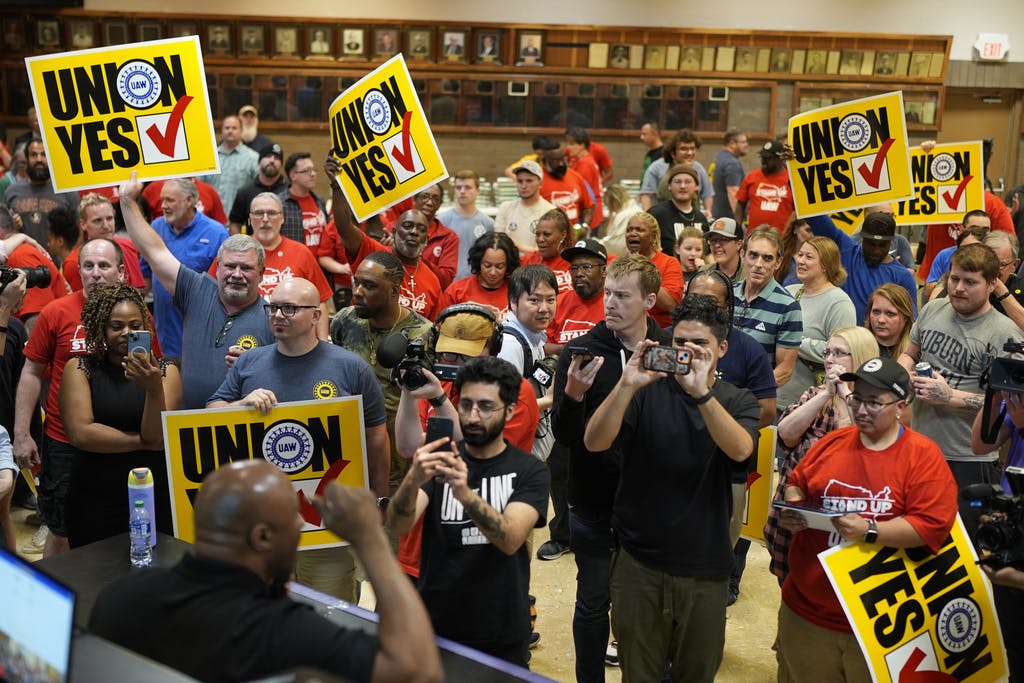Manufacturers, Politicians Brace for Union Push Across the South After UAW’s Victory at Chattanooga
‘The UAW may not find such an easy road at other companies,’ one analyst says.

After a milestone victory in the American South for the United Auto Workers at the Volkswagen plant at Chattanooga, Tennessee, the union is set to face stiff resistance to further organizing efforts both from companies and politicians across the region.
On Friday night, 73 percent of the Volkswagen employees who voted did so in favor of unionizing with the UAW. The final tally was 2,628 in favor and 985 opposed.
The vote was the culmination of more than a decade of organizing at the plant. In 2014, employees voted 712 to 626 against unionizing with the UAW at the plant. In 2019, unionization lost again, 833 to 776.
The most recent vote at Chattanooga was only the first election in a new campaign the UAW has opened up across the traditionally right-to-work southern states. In February, the union pledged some $40 million to support organizing efforts across the South between then and the end of 2026.
At Chattanooga, organizers faced a large anti-unionization campaign supported by politicians — including six Republican governors — as well as private interests like Americans for Prosperity. “UAW broke Detroit. Is Chattanooga Next?” read one billboard sponsored by the group, “Vote no.”
Unionization efforts had brushed up against similar resistance from groups like the Competitive Enterprise Institute and Americans for Tax Reform in past campaigns as well. The difference in 2024 is that the union won.
Pro-management organizations like the Chamber of Commerce have taken to blaming Volkswagen for putting up inadequate resistance to unionization efforts. The vice president at the national Chamber of Commerce, Glenn Spencer, blamed the UAW’s success on their previous campaigns and the fact that Volkswagen ostensibly agreed to remain neutral during the campaign.
“In a political campaign, this would be the equivalent of only one candidate giving speeches, sending out mailers, and launching advertising,” Mr. Spencer said in a statement. “The UAW may not find such an easy road at other companies.”
Despite Volkswagen’s nominal neutrality, the UAW did file an unfair labor practice complaint against the company for what the union said was the company’s aggressive anti-union campaign tactics. It’s notable that the company said that “neutral doesn’t mean silent” when they announced the policy as well.
Still, Mr. Spencer’s observation that other plants will be a tougher row to hoe may prove true in the coming months. Companies like Toyota and Hyundai have already attempted to galvanize themselves against unionization efforts, and state officials are beginning to take action to hamper efforts as well.
In one instance, lawmakers in Alabama moved to advance a new law that would withhold grants, loans, and tax breaks from businesses that voluntarily recognize a union.
In the wake of the UAW’s stand up strike last year, Toyota announced it would raise wages by 9 percent, while Honda announced it would raise wages by 11 percent, and Hyundai promised to raise wages by 25 percent over the next four years.
The union is also targeting plants at non-union auto manufacturers including Nissan, Subaru, Mazda, Mercedes, BMW, and Volvo and electric vehicle manufacturers Tesla, Rivian, and Lucid.
All told, the campaign to organize at non-union automakers is set to play out beyond just the commitments the union has made through 2026, something the UAW president, Shawn Fain, referenced at ahead of the drive at Chattanooga.
“When we return to the bargaining table in 2028 it won’t just be with the Big Three, but with the Big Five or Big Six,” Mr. Fain told Axios last year.
The next major test for the union will come at the Mercedes Benz plant at Vance, Alabama, with results expected on May 17. While it doesn’t appear that anti-unionization organizations have descended on the plant with force, Americans for Prosperity laid some of the groundwork last year, opening a new chapter in Alabama.
The fight at the Mercedes plant, however, is already getting fierce. The UAW has sued the company in Germany alleging that its anti-union campaign is a “clear human rights violation” under German law. If found guilty, the company could face billions in penalties.
While the fate of unionization efforts in Alabama is still yet to be determined, Alabama’s governor, Kay Ivey, also laid out the stakes, as she sees them, for the South earlier this year.
“Unfortunately, the Alabama model for economic success is under attack,” Ms. Ivey wrote on a state Department of Commerce page earlier this year. “I will always proudly support the great Alabama employers and the best employees in the world.”
Mr. Fain responded to Ms. Ivey’s comments, signaling the union’s intention to change how employees are represented in the historically anti-union South, saying “She’s damn right it is.”
“Alabama Governor Kay Ivey recently dared to say that the economic model of the South is under attack,” Mr. Fain said. “It’s under attack because workers are fed up with getting screwed.”
The UAW did not immediately respond to a request for comment.

